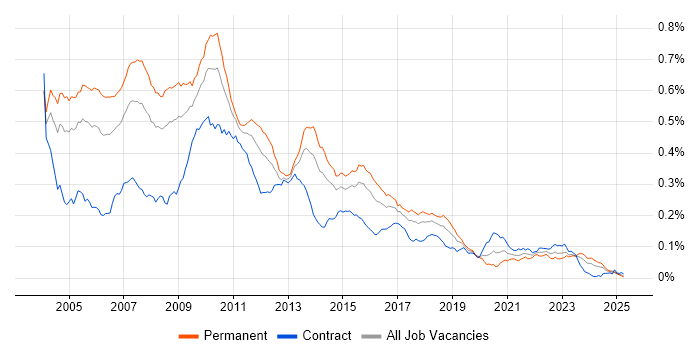Standard Template Library (STL)
UK
The table below provides summary statistics for permanent job vacancies requiring STL skills. It includes a benchmarking guide to the annual salaries offered in vacancies that cited STL over the 6 months leading up to 1 May 2025, comparing them to the same period in the previous two years.
| 6 months to 1 May 2025 |
Same period 2024 | Same period 2023 | |
|---|---|---|---|
| Rank | 688 | 818 | 940 |
| Rank change year-on-year | +130 | +122 | +142 |
| Permanent jobs citing STL | 4 | 78 | 49 |
| As % of all permanent jobs advertised in the UK | 0.008% | 0.079% | 0.047% |
| As % of the Libraries, Frameworks & Software Standards category | 0.047% | 0.37% | 0.16% |
| Number of salaries quoted | 4 | 74 | 25 |
| 10th Percentile | £51,250 | - | £38,500 |
| 25th Percentile | £56,875 | £47,500 | £57,500 |
| Median annual salary (50th Percentile) | £66,250 | £62,500 | £70,000 |
| Median % change year-on-year | +6.00% | -10.71% | +7.69% |
| 75th Percentile | £74,375 | £82,500 | £122,500 |
| 90th Percentile | £77,750 | - | £170,000 |
| UK excluding London median annual salary | £66,250 | £62,500 | £57,500 |
| % change year-on-year | +6.00% | +8.70% | +15.00% |
All Software Libraries and Frameworks
UK
STL falls under the Software Libraries and Frameworks category. For comparison with the information above, the following table provides summary statistics for all permanent job vacancies requiring technical specification, industry standards, software libraries and framework skills.
| Permanent vacancies with a requirement for technical specification, industry standards, software libraries and framework skills | 8,460 | 21,099 | 31,393 |
| As % of all permanent jobs advertised in the UK | 16.26% | 21.42% | 30.21% |
| Number of salaries quoted | 6,443 | 15,769 | 19,367 |
| 10th Percentile | £38,750 | £36,250 | £41,117 |
| 25th Percentile | £51,000 | £45,000 | £50,000 |
| Median annual salary (50th Percentile) | £65,000 | £60,000 | £67,500 |
| Median % change year-on-year | +8.33% | -11.11% | +8.00% |
| 75th Percentile | £87,500 | £80,000 | £87,500 |
| 90th Percentile | £111,250 | £100,000 | £106,250 |
| UK excluding London median annual salary | £60,000 | £55,000 | £57,500 |
| % change year-on-year | +9.09% | -4.35% | +4.55% |
STL
Job Vacancy Trend
Job postings citing STL as a proportion of all IT jobs advertised.

STL
Salary Trend
3-month moving average salary quoted in jobs citing STL.
STL
Salary Histogram
Salary distribution for jobs citing STL over the 6 months to 1 May 2025.
STL
Top 7 Job Locations
The table below looks at the demand and provides a guide to the median salaries quoted in IT jobs citing STL within the UK over the 6 months to 1 May 2025. The 'Rank Change' column provides an indication of the change in demand within each location based on the same 6 month period last year.
| Location | Rank Change on Same Period Last Year |
Matching Permanent IT Job Ads |
Median Salary Past 6 Months |
Median Salary % Change on Same Period Last Year |
Live Jobs |
|---|---|---|---|---|---|
| UK excluding London | +140 | 4 | £66,250 | +6.00% | 25 |
| England | +102 | 4 | £66,250 | +6.00% | 28 |
| Work from Home | +174 | 2 | £60,000 | -25.00% | 13 |
| South East | +80 | 2 | £56,250 | -29.69% | 8 |
| East of England | +56 | 1 | £70,000 | +40.00% | 6 |
| East Midlands | - | 1 | £70,000 | - | 4 |
| Midlands | - | 1 | £70,000 | - | 6 |
STL
Co-occurring Skills and Capabilities by Category
The follow tables expand on the table above by listing co-occurrences grouped by category. The same employment type, locality and period is covered with up to 20 co-occurrences shown in each of the following categories:
